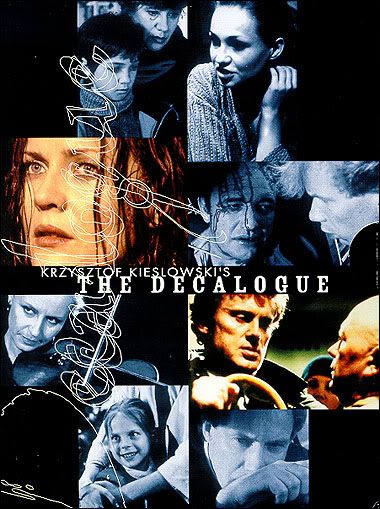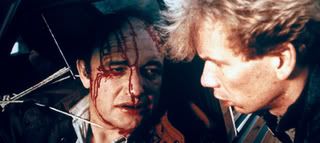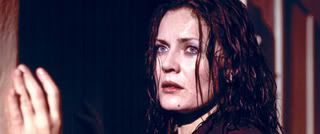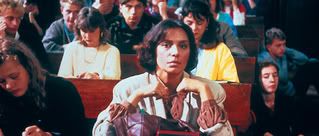The Decalogue (Krysztof Kieslowski, 1989)
 Why have I been such a deadbeat blogger? Aside from that pervasive ennui, it's been mostly because I've been involved with all ten hours of Kieslowski's The Decalogue, ten one-hour films, each that deal with a different commandment. Kubrick said this collection of films was the only masterpiece he'd ever seen in his life. That's quite a reputation to live up to. And while I wasn't droolingly in love with these films, I also wasn't as impatient as I was afraid of after the first two. Instead of writing about each film, or trying to talk about them as a whole, I've picked out my three favorites.  Decalogue 5: Thou shalt not kill. Kieslowski's only overt political statement of the series lies in this anti-death penalty piece. Instead of giving a total picture of a murderer, we see the few hours before the crime, during which the young man is mostly silent and isolated, but tries to reach out to the outside world (throwing the food at the little girls, to their delight) with little success. The crime is done, then the film cuts to after the trial, right before the execution. There is an idealistic young lawyer who has his whole livelihood put into question through the verdict, and the young killer who just wants to be buried in his family's plot. An incredibly realistic, humane portrait of the justice system. There are no judgements on Kieslowski's parts, just facts and people. Decalogue 5: Thou shalt not kill. Kieslowski's only overt political statement of the series lies in this anti-death penalty piece. Instead of giving a total picture of a murderer, we see the few hours before the crime, during which the young man is mostly silent and isolated, but tries to reach out to the outside world (throwing the food at the little girls, to their delight) with little success. The crime is done, then the film cuts to after the trial, right before the execution. There is an idealistic young lawyer who has his whole livelihood put into question through the verdict, and the young killer who just wants to be buried in his family's plot. An incredibly realistic, humane portrait of the justice system. There are no judgements on Kieslowski's parts, just facts and people. Decalogue 6: Thou shalt not commit adultery. Along with part 5, part 6 was made by Kieslowski into a slightly longer film for foreign distribution; I can see why, as these two are the parts with the most universal storylines. A young man spies obsessively on his neighbor and falls in love with her. When he finally gets his chance to be with her, he realizes love (or lust) isn't as ideal as he had thought. Kieslowski uses a potentially creepy situation to illuminate the fact that life is almost never what we think, which can be both a good and a bad thing. The acting in this one is the best of any of the films, provoking empathy on my part. Decalogue 6: Thou shalt not commit adultery. Along with part 5, part 6 was made by Kieslowski into a slightly longer film for foreign distribution; I can see why, as these two are the parts with the most universal storylines. A young man spies obsessively on his neighbor and falls in love with her. When he finally gets his chance to be with her, he realizes love (or lust) isn't as ideal as he had thought. Kieslowski uses a potentially creepy situation to illuminate the fact that life is almost never what we think, which can be both a good and a bad thing. The acting in this one is the best of any of the films, provoking empathy on my part. Decalogue 8: Thou shalt not bear false witness against thy neighbor. Perusing the imdb message boards (a frequent vice of mine), I found that part 8 is generally the least favorite of those who have seen the series. I think the story is the most compelling, for certain: an ethics professor is confronted by a ghost from her past, the grown-up version of the little girl who she sent to almost certain death during the Nazi occupation. Most of the tales are surprisingly optimistic at their ends (Kieslowski sees the glass as half-full!), but none more than this one. The two women talk, and the professor gains peace of mind, as she had always wondered what happened to that little girl, and the visitor regains confidence in the good intentions of mankind. I was struck by how the moment portrayed in the film was definitely the defining moment of both characters' lives, trumping that moment forty years ago. Decalogue 8: Thou shalt not bear false witness against thy neighbor. Perusing the imdb message boards (a frequent vice of mine), I found that part 8 is generally the least favorite of those who have seen the series. I think the story is the most compelling, for certain: an ethics professor is confronted by a ghost from her past, the grown-up version of the little girl who she sent to almost certain death during the Nazi occupation. Most of the tales are surprisingly optimistic at their ends (Kieslowski sees the glass as half-full!), but none more than this one. The two women talk, and the professor gains peace of mind, as she had always wondered what happened to that little girl, and the visitor regains confidence in the good intentions of mankind. I was struck by how the moment portrayed in the film was definitely the defining moment of both characters' lives, trumping that moment forty years ago.And that's the best part of Kieslowski's Decalogue: it leaves you with hope for mankind, as well as giving you a reason and new way with which to look inward. While to me, it certainly isn't the masterpiece Kubrick said it was, it is still an impressive monument to philosophical film that should be seen; perhaps you, like me, might want to take it over several weeks, though. Labels: 1989, krysztof kieslowski |

Comments on "The Decalogue (Krysztof Kieslowski, 1989)"
post a comment